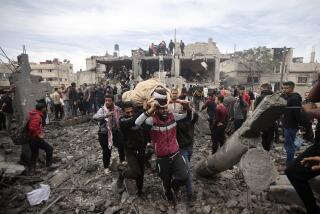Heroes Who Have No Day
- Share via
When three members of a refugee relief group died in April after their car careened off a muddy road in Albania, it brought to mind an unsettling fact: Hundreds of humanitarian aid workers are casualties of the chaos of global poverty, war and disasters every year. We have no Memorial Day for such heroes because we do not yet acknowledge how central they are to the way the world works.
The several holidays that commemorate the military, including Memorial Day, Veterans Day and Armed Forces Day, celebrate an older idea of service to the nation and to the cause of peace and security. It imparts no disrespect to say that we should also honor the sacrifices and the hard-earned wisdom of those who serve peace in other ways, ways which now stand at the epicenter of global crises.
The three relief workers who died were on their way to refugee camps near Kosovo. They, and many like them, have also been to the scenes of other human-made disasters in places like Bosnia, Cambodia and Rwanda. They were there because such places are now the nexus of global peace and security. The messy, unconventional nature of conflict now calls forth a new kind of soldier, one not armed with weapons, but possessing skills of healers.
Kosovo underscores this is as few other conflicts have: The futility of the old-style warfare with its $1-million smart weapons, and the consequent need for the new peacekeepers of the humanitarian mission. Yet they bear risks in horrid conditions, and at times are directly attacked.
U.N. organizations alone experienced more than 100 killings in 1998, and private groups are no less vulnerable. The Red Cross had four workers in Sudan murdered this spring, a grisly reminder of the six nurses murdered in Chechnya in late 1996. Seventy aid workers have been taken hostage in Chechnya, another 50 in Somalia. These morbid statistics do not include death and disability caused by accidents or disease.
Even less familiar are the countless organizations living and working among the 4 billion impoverished people of the world, providing core services and trying to improve lives by small steps, a decidedly unglamorous endeavor, but essential to stability.
Governments certainly do not take these humanitarian groups for granted. In some places, they are viewed as enemies of the state, and banned or harassed. Western governments channel much of their aid through such organizations, making them functionaries of foreign policy much like armies.
In the Balkans, Rwanda, Congo and Cambodia, the humanitarian aid groups have constituted the most vital “on the ground” presence from the West. They are the most likely conduits of intervention in conflicts now, far more so than armies.
But our political culture, still stuck in the symbolism of military glory, fails to honor any but those who wore a uniform. How can we commemorate the thousands of these aid workers who have sacrificed their lives for others?
They don’t really need a holiday in their honor.
What we need is something that recognizes the extraordinary role these private groups are playing, a role that governments or businesses cannot or do not play.
More concretely, measures are needed to protect aid workers, something the Western powers are reluctant to do. Funding for all but the most dire emergencies is dropping, even as we know now how effective preventive action can be. And we should feast from the experience of this worldwide phenomenon: The leaders of these organizations are unofficial diplomats who could lend their expertise to policymakers if only the State Department had a mechanism for hearing them, which it does not.
That’s the way to honor these heroes of the global battle for justice and equity. Let others have the parades.
More to Read
Sign up for The Wild
We’ll help you find the best places to hike, bike and run, as well as the perfect silent spots for meditation and yoga.
You may occasionally receive promotional content from the Los Angeles Times.






